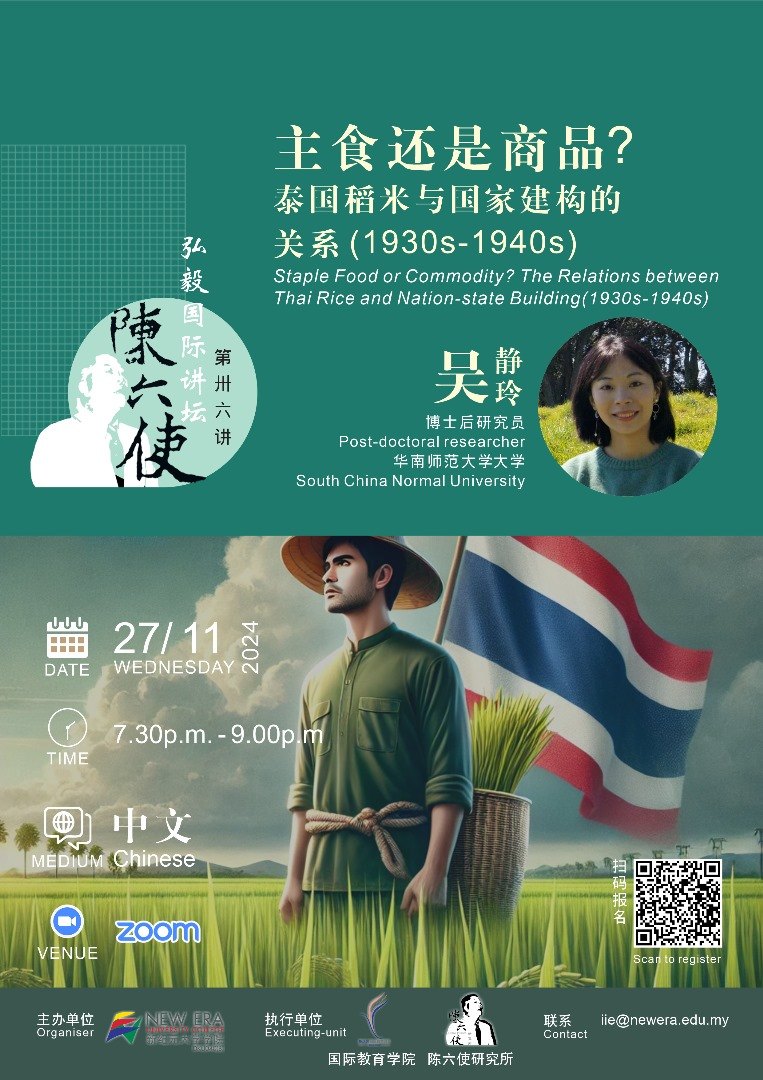【36th Talk】Dr. Wu Jingling: “Staple Food or Commodity? The Relations between Thai Rice and Nation-state Building (1930s-1940s)”
Upcoming Event

Introduction |
The 36th session of the “Tan Lark Sye Lecture Series,” organized by the Institute of International Education and the Tan Lark Sye Institute at New Era University College is now open for registration. The lecture will be delivered by Dr. Wu Jingling of the Center for Southeast Asian Studies, South China Normal University. The topic of this article focuses on Thailand’s nation-building process during the 1930s and 1940s, a period marked by political turbulence. The nation’s nation-building project faced significant challenges during this time. On the one hand, Thailand's political system was transformed from an absolute monarchy to a constitutional monarchy. On the other hand, the political framework, which centered on Thai identity, led to a series of racial tensions. Furthermore, Thailand had to navigate various international political forces while carefully safeguarding its independence. The rice industry, as Thailand’s most crucial economic, cultural, and political resource, was deeply intertwined with these political and economic issues. This article analyzes the complex relationship between the different roles of rice—as a crop, a food, and a commodity—and the challenges faced during the nation-building process. It argues that the Thai government chose to emphasize the commodity aspect of rice to address these challenges, while downplaying its role as a staple food, as the latter could not fulfill the practical needs of the nation-building agenda and the construction of national discourse. |
Speaker |
Dr. Wu Jingling (South China Normal University) |
Moderator |
Dr. Lew Siew Boon (Assistant Professor, Institute of International Education, NEUC) Dr. Lew received her PhD from the National University of Singapore and is currently an Assistant Professor at the Institute of International Education, New Era University College, as well as the Head of the International Academic Exchange Office. Her main research interests include folklore and folk culture, and the history of Chinese communities in Singapore and Malaysia. She has published several works, including Discovering the Goddess of Mercy in Swee Nyet Temple of Pulai, Kelantan and Hakka in China and Southeast Asia: Cross-Regional Field Work and Essays (co-authored). She has also published more than 20 academic papers. |
Information |
Date: 27th November 2024 (Wednesday) |
Trailer (Video)
Lecture Postscript
The 36th session of the Tan Lark Sye series lecture took place on 27th November 2024, featuring Dr. Wu Jingling, a postdoctoral researcher at the Southeast Asia Research Center of South China Normal University, as the guest speaker. Dr. Wu’s lecture, titled "Staple Food or Commodity? The Relationship Between Thai Rice and Nation-Building (1930s-1940s)," examined the complex interplay between Thai rice and the nation-building efforts of the era.
Dr. Wu, a scholar specializing in the history of Chinese communities in Southeast Asia, earned her Ph.D. in Chinese Studies from the National University of Singapore in 2020 and has published extensively in her field. In her talk, she explored the challenges Thailand faced during the turbulent 1930s and 1940s, a period of profound transformation and political instability. These challenges included the transition from an absolute monarchy to a constitutional monarchy, the emergence of a Thai-centred cultural and political identity that fuelled ethnic tensions, and the delicate task of maintaining national independence while navigating a colonial-dominated international landscape.
Central to this nation-building process was rice, Thailand’s most significant economic industry. Dr. Wu illustrated how rice served not only as a staple food but also as a crucial economic, cultural, and political resource, entangled with the nation’s socio-political and economic dilemmas. By examining rice’s roles as food, crop, and commodity, she shed light on its critical function in shaping the Thai nation-state during this formative period.
The lecture concluded with an engaging Q&A session, where the audience and moderator delved deeper into the topics of rice’s significance and the role of Chinese rice merchants in Thailand’s rice industry and nation-building efforts. The session was moderated by Asst. Prof. Dr. Lew Siew Boon of New Era University College.



开展讲授.png)
